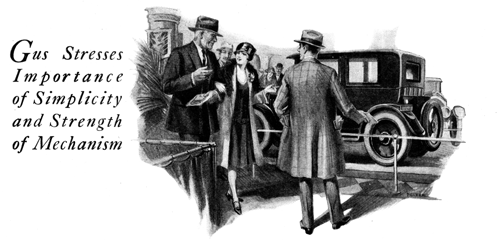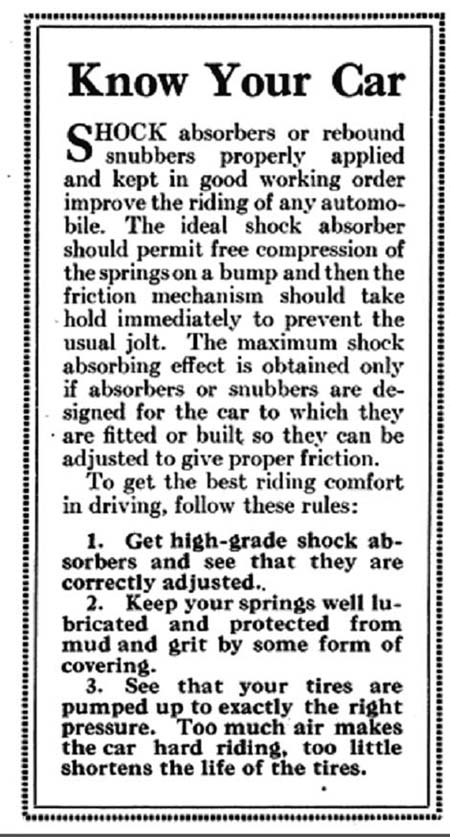May 1926
HOW TO PICK THE BEST CAR IN ITS CLASS
by Martin Bunn

"Now," said Gus Wilson to his nephew, Henry, as they passed through the gate at the Milbury Auto Show, "the first thing for you and Grace to decide is how much you can afford to pay for a car. Then we'll see what looks like the best buy in that class."
Henry had just been handed another raise in salary and felt that at last he could afford to yield to his bride's pleading that he buy a car. He had persuaded his uncle and Joe Clark, proprietors of the Model Garage, to help him make a selection.
"And don't forget," warned Gus, "that buying your car on time gives you no excuse for spending too much for it."
"A thousand is about the limit." said Henry. "I'm sure I can swing that much."
"That means not over nine hundred for the list price," broke in Joe Clark, "because freight, taxes, license and the rest of the incidentals will certainly run it up to the thousand mark."
"I'd like to get one of those sporty-looking roadster types," said Henry a few moments later, as he gazed longingly at a flashy job finished in pale green with lots of nickel fittings.
"Why, Henry," chimed in his wife, "you promised me a sedan. I don't want a car that will hold only two people."
"Grace is right, son," Gus said. "If you can have only one car, the best buy is a closed model, but I'd recommend a coach. You get a lot more for your money than you do in a sedan. Roadsters are all right for rich people who can afford to keep more than one car. I'll admit that it's a nuisance when you want to take along some of your friends.
"And," continued Gus, "if you'll lay off any car that is painted in very light colors. Dust and the tar they put on the roads will make one of those pale pink babies look like the dickens in short order. Stick to a dark blue or green unless you want to spend all your spare time washing it."
"I wouldn't give a fig for all the closed cars in the world," growled Henry peevishly.
"Then why not compromise on a touring car?" suggested Gus with a wink at Joe.
"Humph!" exclaimed Henry. "And have about a million curtains to put up every time it rains!
Nothing doing! If we don't get a roadster, we might as well go the limit and get a coach."
"I'm so glad that's settled at any rate," observed Grace. "Can't we get one of those eight cylinder things? You know Agnes' husband bought her one, and it's just too smooth for anything!"
"There's the woman of it!" grunted Gus. "Always trying to keep up with the Jones's. You couldn't' possibly get an eight-cylinder car for the price Henry mentioned. You can get a good six, though."
"Seems to me a four-cylinder car would be a lot easier for repair than a six," said Henry as they passed a shiny new four-cylinder model.
"You're dead right, son," stated Gus emphatically. "Just fifty percent less work when it comes to grinding valves or putting in new rings or tightening up connecting rod bearings. And it's a whole lot easier to locate trouble in a four-cylinder engine, too. There was a time when the four-cylinder cars were a whole lot rougher running than the sixes, but what with light pistons and good stiff crankshafts, the four-cylinder cars of today are pretty durn smooth. If you look at it from the standpoint of expense for repairs and the amount of work you will have to do yourself, the four-cylinder car is certainly the best bet.
"Outside of work on the motor itself, a light six won't require any more attention than a four. Changing tires or overhauling the rear end or anything like that is the same on both. Are you going to drive the car too, Grace?"
"You bet I'm going to drive!" said Grace emphatically.
"Then don't forget, Henry, that a six-cylinder car needs less gear shifting than a four. Grace would get along better with a six on that account. Whatever car you buy, though, be sure that the brake and clutch pedals work easy. It doesn't make much difference whether Grace can reach the pedals or not. You can fix that by putting a cushion behind her back. In fact, it would be better to pick a car with plenty of leg room so you won't feel cramped on long drives."
"What's the dope on overhead valves, uncle? Are they really much better?"
"Theoretically they are -- all the racing cars use them," replied Gus. "But in a car for ordinary use I can't see that there's much advantage.
They may result in a slight saving of gasoline as compared with the ordinary valves that are placed in a pocket beside the cylinder head. Also, with overhead valves, you can take the cylinder head off and remove it to a warm place in the cellar when you want to grind the valves instead of working in a cold garage. On the other hand, overhead valves usually are noisier, and as there are more parts in the valve mechanism, there is more to replace when things begin to wear."
"Humph!" exclaimed Henry. "It sure is a hard job to pin you down to a definite opinion as to what is really the best!"
Gus smiled.
"For darn good reason, son, that there isn't any such thing as best. The fact that there are so many different ways in which gasoline motors are made shows that the designers can't agree. Whenever there are two ways to make a piece of machinery, there are always good arguments for either way, and you'll have to decide for yourself which of these ways fits in best with your way of doing things."
"Do you think a car with four-wheel brakes is safer, uncle?" questioned Henry as he stooped down to inspect the front-wheel brakes on one of the exhibition cars.
"Don't worry your head over four-wheel brakes," advised Gus thoughtfully.
"I've fixed a powerful lot of brakes, and so far as I can see, there isn't much in this four-wheel business as compared with one real good pair of brakes on the rear wheels. Four-wheel brakes are fine in theory, but durned few of the outfits that I've looked over were working right, and on the low-priced cars I'm inclined to think that their disadvantages just about make up for their advantages."
"They say you can stop quicker with 'em," Henry argued.
"You can if they are adjusted right; but you have to be careful not to have the front-wheel brakes too tight or they might lock if you jammed on the brake pedal too hard. And if the front wheels lock, son, you are mighty likely to get into a nasty front-wheel skid. Mind you, I'm not suggesting that you don't buy a car with four-wheel brakes. The point is, I wouldn't consider them a feature that would influence me to buy some particular make of car that was no better in other ways than another that did not have them."
"Those wheels look pretty solid," observed Joe as he directed their attention to a sedan equipped with disk wheels. "Sure they're solid," grunted Gus. "Why shouldn't they be -- made of metal the way they are?
As far as I can see, about the only advantage of disk wheels is that you can keep them clean easier than the wood wheel. On the other hand you have to take your wheel off or else crawl under the car every time you want to adjust the brake bands. You can't work between the spokes as you can with wood wheels."
"But, uncle, they look so spiffy!" urged Grace.
"And we've just got to be stylish!" observed Gus sarcastically. "All right, Henry, let her have the disk wheels if she thinks them classy. You can take the extra amount out of her allowance!"
"That's not fair," said Grace, pouting. "Get your old wood wheels if you think they're just as good."
Henry was collecting catalogs right and left. "I'm going to study these over mighty carefully when we get home," he said, as he vainly attempted to stuff another large folder in a pocket that was already crammed full.
"That's a good idea," Gus agreed.
"While you're here, you and Grace had better sit behind the wheel of every car in your price class so as to get a line on whether there's enough leg room. Work the pedals, and see if the gear shift lever is handy. Watch out for any car that has a gear lever that slides up under the dash when you go into reverse. It'll take all the skin off your knuckles if you have to back up in a hurry.
"Suppose Joe and I leave you now for a while," Gus concluded. "We want to look over some of the accessory exhibits. We'll meet you at the door in about three quarters of an hour."
"Why can't we look over the accessories, too?" asked Henry.
"Nothing doing!" Gus ordered. "You stay away from the accessories or you'll end up by fitting that new car with more junk than it will carry. No, sir! All you need in the way of accessories -- at least to start with -- are front and rear bumpers, a rear vision mirror, a windshield wiper and a spare tire!"
"I don't want to butt in, Gus," said Joe when the young couple were out of hearing, "but it kind of seems to me that it would be a good idea if Henry bought a second-hand car. He barely knows how to drive, and Grace never even has learned how. They are bound to do a lot of rotten gear shifting, and the chances are that they will run into a lot of minor accidents the first year. And if they're going to bust things up it might better be a second-hand outfit."
"That's all true," said Gus. "At least it would be in any ordinary case. But Henry is careful and he's the kind of a bird who can't seem to take pride in anything unless it's just right. He'll take much better care of a new car than he would of an old one. Besides, if he got a second-hand car, I'm afraid the Model Garage would have to do a lot of free repair work this year!" he concluded with a chuckle.
END
L.Osborne 2019
